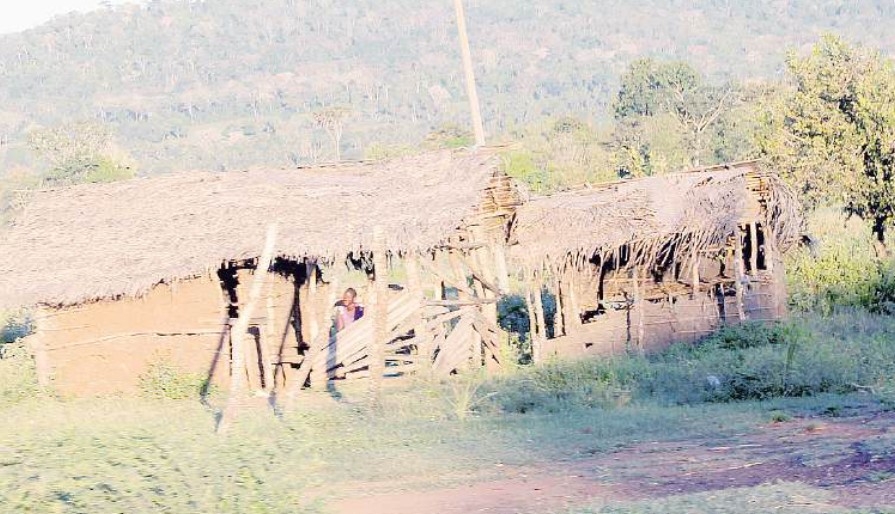Veganism on the rise
Veganism has been gaining traction around the world, supported by campaigns such as "Veganuary" (which encourages people to go vegan for one month) as well as rising awareness of the climate benefits of a meat- and dairy-free diet. A growing body of research suggests plant-based diets have a range of health benefits for adults.
In India, the growing vegan movement taps into an ancient tradition, with vegan social media groups and influencers highlighting the nutritional power of local cereals, pulses and grains. Indian vegans swap traditional recipes in groups like "Cooking with Millets" ("Let's share our millet journey"), which promotes a cereal crop endemic to India. Vegan influencers tout the benefits of age-old ingredients such as lentils, chickpeas and mung beans. In 2016, the German International Academy, a residential school in Southern Indian city of Chennai, made headlines when it became a fully vegan school.
And while many Indian vegetarians rely heavily on dairy products such as ghee (clarified butter), yoghurt, and paneer (cottage cheese), Jain points out that in the past, this wasn't necessarily the case, as many traditional dishes are dairy-free.
However, for children, the risks and benefits of a vegan diet are somewhat more complex than for adults.
Planning a safe vegan diet
Perhaps the most important aspect to consider is that a growing child needs specific nutrients for each developmental stage. If those are missed, the consequences can be dangerous, especially for younger children. Their food also needs to be particularly nutrient- and energy-dense, because their portions are smaller.
"Infants and children are growing and developing rapidly (especially during infancy) and have very high requirements for certain nutrients while having relatively small stomachs. This means that the foods they are given should have maximum nutrients and enough energy in a relatively small volume," says Mary Fewtrell, professor of paediatric nutrition at University College London's Great Ormond Street Institute of Child Health.
For infants, breast milk is seen as the best way of delivering the nutrition and energy they need to grow, while for toddlers and young children, a vegan diet needs to be carefully planned to ensure it meets their needs.
Misguided veganism has in fact resulted in some rare, avoidable tragedies in that age group. In 2016, a one-year-old child in Milan, Italy was taken away from his parents after blood tests revealed that he had dangerously low levels of calcium after following a vegan diet. Italian media reported that the one-year-old weighed as much as a three-month-old, and his calcium levels were only enough to barely survive. In 2017, a court in Belgium convicted the parents of a seven-month old baby boy who had died from dehydration and malnourishment after being fed a diet of vegetable milk made from oats, buckwheat, rice and quinoa.
For older children, research suggests that a vegan diet can have benefits – but also, some disadvantages.
Groundbreaking research on vegan kids
In 2021, a study published in the American Journal of Clinical Nutrition compared the health outcomes of a vegan, vegetarian and omnivorous diets in Polish children aged 5-10 years. The study recruited 63 vegetarians, 52 vegan and 72 omniovores – the latter eating a diverse diet which included meat and dairy. Malgorzata Desmond, the lead author of the study, is now an honorary research fellow at UCL Great Ormond Street Institute of Child Health.
"Although the number of children in our study was relatively small, this is the largest study of its kind ever performed specifically in vegan children of this age; the first that recruited (over) 50 participants in each plant-based diet group and compared them to carefully matched omnivores," says Desmond.
The study identified both good and bad points for vegan kids, says Fewtrell, who co-authored the study. "The good news was that in comparison to their omnivore peers, the vegan children were leaner and had better markers of cardiovascular risk, such as lower blood cholesterol," she says. This could contribute to their lowering of heart disease later in life. "The downsides were that they were shorter and had lower bone mass than expected for their age."
The only finding that the researchers thought was concerning was the vegan children's lower bone mineral density
While vegan kids were 3cm (1.2in) shorter on average, it didn't mean that they were stunted in growth or would always stay short, says Jonathan Wells, professor of anthropology and paediatric nutrition at UCL and another co-author of the study.
"Vegan kids had less fat mass, and tended to weigh less. It's possible that they would reach puberty a little later. We've seen that children who reach puberty later actually extended their growing period because they grow for more years," says Wells. So there was a potential for these kids to grow taller as adults.
The only finding that the researchers thought was concerning was their comparatively lower bone mineral density.
"The bone reaches its optimal density by the early 20s. And so, if you don't build bone density at the time, you're not going to be able to do that later," Wells says. Those who have lower bone mineral density in adulthood will feel its impacts in older age, making them more vulnerable to diseases like osteoporosis as bones slowly grow more brittle. "So vegan diets may have changed the profile of disease that people are more at risk to as they age," says Wells. "Instead of cardiovascular disease [heart disease], they may be prone to bone disease (weaker bones). But it's not like they're unhealthy now."
Some of the study's findings were surprising. For example, the vegetarian children tended to eat more junk food like pizza and soft drinks – a reminder that a vegetarian diet doesn't in itself guarantee a healthy, balanced menu. As might be expected, omnivores had the highest estimated intake of protein, and vegans the lowest – but vegetarians had the highest estimated intake of calcium. (Vegans, it turns out, had the lowest).
And nearly a third of children on either vegetarian or vegan diets in the study were not given any B12 supplements or B12–fortified foods – even though such supplements are commonly recommended for people on a plant-based diet. The Academy of Nutrition and Dietetics in the US for example states that well-planned vegetarian and vegan diets are appropriate for all life stages, including pregnancy, infancy and childhood. But it also adds that vegans need to ensure they take vitamin B12, be it in the form of supplements or fortified foods.
One possible conclusion is that some of these real-life plant-based diets could have had better results, had they included more nutritious ingredients. Or, as the authors state in the paper: "Vegan and vegetarian children need guidelines on how to eat healthfully, beyond advice on supplementation."
More generally, studies of plant-centred diets – so, vegetarian, not just vegan – tend to conclude that they are safe for children. A longitudinal study of children aged from six months to eight years in the US found there was no evidence of clinically meaningful differences in growth or nutritional status for children with a vegetarian diet, compared to their peers. However, the vegetarian kids (the sample also included vegans) faced higher odds of being underweight. The German Society for Paediatric and Adolescent Medicine also took an overall positive stance in a 2019 paper on vegetarian (including vegan) diets for children and teens, stating that "the nutritional needs of growing children and adolescents can generally be met through a balanced, vegetable-based diet", though it adds that a vegetarian diet in childhood and adolescence requires supervision by a paediatrician, and that vegans should supplement B12.
A meat-based diet may also harbour risks of its own, due to the hormones found in meat and milk – though the evidence on this is mixed. "In intensive farming, concentrations of estrogens in milk are higher due to long milking periods," state the authors of one review of studies on estrogens in cow's milk and their potential health effects. They point out that exposure to these hormones can impact children, and disrupt their development in ways that may only become evident in adult life, for example, through a lower sperm count. However, they also argue milk has a number of health benefits. The review concludes that while the amounts of estrogens in cow's milk are too low to affect the health of adult humans, more research should be done on the impact on children, especially during the earliest stages of development.
Back to the roots
In recent years, the global spotlight has often been on plant-based novelties such as vegan cheese or meat-free burgers, which have made it easier for many to switch to a more plant-centred diet. But the focus on these eye-catching innovations can risk missing other ingredients that have been around for centuries – and which could fill some of the potential nutritional gaps of vegan family meals.
Bhavya Chandra Prem, a 33-year-old technical engineer who grew up in the Kunnur district of the Southern Indian state of Kerala, grew up on a predominantly non-vegetarian diet of beef, chicken stew and parathas (an Indian flat bread). She turned vegan almost overnight in 2014 after moving to Spain for university, when a vegan friend and housemate asked her "Why would you want to kill and eat something you love?" A little research showed her the horrific realities of the meat and dairy industry. "I watched a few documentaries like Cowspiracy, Earthlings and I couldn't live a lie and consume meat or diary or fish products. I have been vegan ever since and I haven't looked back," says Prem, who now lives in the Czech Republic.
In 2020, when she learnt that she was pregnant, she had to contend with terrible morning sickness until 22 weeks, and could barely keep anything down except crackers, rice and soup. When that phase passed, she started seeking out healthier and nutrient-dense vegan food with the support of her husband, who is Italian. Her gynecologist said that following a vegan diet wouldn't harm their growing child, as long as she ate high-protein foods.
"I ate different types of dals (split pulses), lentils and legumes and tons of vegetable soups, tofu and soy products," she says. Her favourites were cherupayaru (a curry made with mung beans), and Kerala-style stews, which typically include coconut milk.
In November 2021, her baby boy was born at a healthy 3.6kg (7.9lb), and he is doing well, Prem says. While she adds she doesn't want to impose her own ethical values on her son, she will expose him to more diverse foods beyond meat as he grows older.
Protein-rich foods
Edwina Raj, a clinical dietician at the Bengaluru-based Aster CMI hospitals, points out that India's traditional foods offer plenty of options for vegans. "We've seen that some vegans tend to rely too heavily on refined flours and carbohydrates," she says. "Instead, they'll need to focus on complex carbs. We suggest the many varieties of unpolished rice – red, brown, black. As a vegan parent, you'll need to keep in mind the dietary requirements for protein are 1g per kg of body weight and plan your meals accordingly." She recommends millets, lentils, dried green peas and beans as sources of high-quality protein.
Karla Moreno-Bryce (MDA, RD, LD), a vegan Pediatric Nutrition Coach based in Minneapolis, in the US argues that regardless of the family's chosen cuisine, planning healthy vegan meals can be relatively easy.
"Meal prepping for vegan kids just requires a little attention to ensure that key nutrients (iron, zinc, iodine, omega-3s, calcium, Vitamin D, and Vitamin B12) are offered during the day through a variety of plant foods and dietary supplements," she says. "It's particularly important that all vegan kids receive a reliable Vitamin B12 supplement, preferably at the time they begin solid foods. This is a nutrient that naturally lacks in plant foods and a supplement, in addition to fortified foods, is the most reliable source of meeting this important nutrient."
With the right mix of ingredients, she says, parents can offer healthy vegan versions of many different cuisines: "Many vegan parents focus on ensuring that their children's meals consist of vegetables, and while they are important and provide an array of nutrients, they lack the calories to support a child's growth and development. I encourage vegan parents to focus on providing foods rich in iron (such as beans, lentils, and tofu) and fat (such as avocado and nut butters) since these are two important nutrients during periods of rapid growth," says Moreno-Bryce.
To meet his growing vegan child's nutritional needs in India, Ashish Kumar Jain has turned to locally grown leafy vegetables, like local spinaches, methi (fenugreek leaves), cumin seeds, coriander, and curry leaves, as well as nutrient-dense sesame seeds, tofu and finger millet. He substitutes milk with extracts from almonds and coconuts, makes "cheese" from cashews and potatoes, and yoghurt from peanut milk.
"We've never felt deprived of dairy," he says. "And there are many reasons to prioritise veganism that go beyond diet and health – compassion for animals, climate and sustainability. Veganism is a social justice movement, as much as it is a healthy choice."
* Disclaimer: All content within this article is provided for general information only, and should not be treated as a substitute for the medical and dietary advice of healthcare professionals.
“WATCH: The latest videos from the Star”















